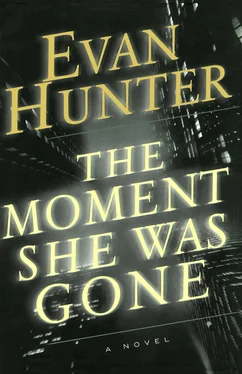“Honey, where are you? Tell me, okay?”
“I’m someplace safe. Don’t worry, Andy. You don’t have to worry about me. I’m okay now.”
“What’s that noise I hear?”
“What noise? I don’t hear any noise.”
“That sound? What is it, Annie?”
“Let me talk to her,” my mother says, and snatches the phone from my hand. “Annie?” she says. “Honey, I’m so sorry we argued yesterday, there was no need for that. I love you, Annie, I love you with all my heart. Please come home, and we’ll work out some way to...” She looks at the receiver. “Annie?” she says. “Annie?” and turns to us, a surprised look on her face. “She’s gone,” she says, and gently replaces the phone on its cradle.
“What’s her cell phone number?” I say. “You must have it someplace.”
“I don’t remember her giving it to me.”
“If she gave it to you, where would it be?”
“In my book.”
“Where’s your book, Mom?”
“The desk there.”
With a sideward dip of her head, she indicates a drop leaf desk on the wall just inside the entrance door. Aaron and I start for it in the same moment, almost colliding. We back off, and then start for the desk again. I reach it first. There is a small key in the drop leaf front. I twist the key, hold it to pull open the flap.
“Where, Mom?” Aaron asks.
“It should be there someplace.”
“Where?” I shout, and the phone rings again.
“Don’t anybody touch it!” I yell, and run across the room for it, the phone ringing twice, three times, I yank the receiver off the cradle.
“Annie?”
There is an instant’s surprised silence.
Then a man’s voice says, “May I speak to Helene Lederer, please?”
“Who’s this?” I ask at once.
“My name is Jason. If you have a moment, I’d like to explain the advantages of the ultimate mileage card. Is this Mr. Lederer?”
“Goodbye,” I tell him, and hang up. “If it rings again, please let me...”
The phone rings.
I snatch the receiver from its cradle.
“Hello?”
“Where’d you go, Andy?”
“Don’t hang up, honey.”
“Just don’t put Mom on again, okay?” she says.
“I won’t.”
“Promise?”
“I promise. Where are you, Annie?”
“On my way to the North Sea,” she says.
“Are you at an airport?”
“In a sense, bro, in a sense.”
“What’s that sound, Annie?”
“Beats me. Listen, I want to tell you something.”
“Tell me.”
“Do you remember when we thought a raccoon was breaking into the house? That was me. Andy.”
“I know. You told me.”
“I did? What a big-mouth, huh? I was watching the road for Daddy.”
“I know.”
“You think he’s ever coming home, Andy?”
“I don’t think so, hon.”
“Does he really have another little girl?”
“I’m sure he doesn’t. You’re his little girl. Annie. Tell me where you are, and I’ll come get you.”
“You don’t have to worry, I’m okay.”
“I just miss you, hon. Tell me where you are.”
“Just don’t worry about me, okay?”
“Annie... is that the wind I hear?”
“I don’t know what you’re hearing, Andy. I’d better go now,” she says abruptly, and hangs up.
Aaron sees the look on my face.
“What?” he says.
“I know where she is,” I say.
“Where?”
“I’ll be back,” I say, and start for the front door.
“Let me come with you.”
I turn to him. My hand is already on the door knob.
“I’d better go alone, Aaron.”
Our eyes meet.
Aaron nods.
“Good luck, bro,” he says.
I open the door and step out into the hall. Behind me, I hear my mother say, “Don’t call the police!”
I close the door on her words, and walk swiftly to the elevators.
There is more traffic in the streets than anyone might expect on a hot weekday in August, when most New Yorkers are at the beach or in the mountains. And though I keep urging the turbaned Sikh cabbie to please step on it, his dark-eyed gaze meets mine implacably in the rear-view mirror. He drops me off on the northeast corner of Columbus and Seventy-second. I turn the corner and hurry eastward, toward the park. There is a dry cleaning establishment that wasn’t there sixteen years ago. There is also a deli I don’t remember. The candy store seems familiar but I do not recognize the Korean man behind the counter.
The building we lived in for so many years stands like a white-brick fortress between two shorter red-brick buildings that flank it like bookends. A green awning with the address on it in white stretches toward the curb. There was no uniformed doorman when we were living there. Neither is there one now. There is, instead, a short sturdy man in his sixties, wearing jeans and high-topped workman’s shoes, and a blue denim shirt with the sleeves rolled up to his forearms.
The years have been kind to Mr. Alvarez.
His complexion is smooth and his dark eyes sparkle, and the mustache under his nose is neatly trimmed. He turns as I approach the building, smiles, asks, “Help you, sir?” and then recognizes me. “Andrew?” he says. “Andrew?” and holds both hands out to me. I take his hands. Grinning, he keeps staring into my face. “How are you, Andrew?” he asks. His accent is as thick as it was when I was a boy growing up. “Are you looking for your sister?”
“Yes. Is she here?”
“She got here about an hour ago. I let her go up the roof to see the pigeons. Is that okay?”
“Sure, thank you, Mr. Alvarez.”
I am thinking she was wandering the city all night long. She just got here an hour ago. I am thinking I may not be too late.
“Is she all right, Andrew?”
I hesitate for a moment.
Then I say, “No, Mr. Alvarez, she’s very sick. Can you please call the police for me, tell them to send an ambulance? I’ll be on the roof with her.”
“She works for the FBI now, your sister?”
“No,” I say, and rush into the lobby toward the elevator bank. I push the button, and the doors slide open. I move into the car, press the button for twenty-three.
“Is your father still painting?” Mr. Alvarez asks.
But before I can answer, the doors close.
The big metal fire door to the roof is closed, but not locked. I twist the knob, and shove the door open, and come out onto a tarred roof that is blisteringly hot in the noonday sun. I turn automatically and at once toward the pigeon coops on the right. The birds huddle on their perches, cooing softly, gently rustling their wings.
Annie is sitting on the floor of the roof, in the shade of the pigeon coops, her back to them, her arms around her knees, her head bent. She is wearing a light chiffon shift that riffles in the breeze. Her hair is blowing around her face. Twenty-four stories below, I can hear the rush of traffic, the incessant murmur of the city. I walk to her swiftly.
“Annie?” I say.
She looks up.
“Hi,” she says. “Which one is Lyo-lyok? I looked at all the geese, but I couldn’t tell which one she is, they all look the same to me now. None of them have identities anymore.”
“I don’t think she’s here, honey.”
“Oh, sure, she is. She’s going to fly me to the North Sea.”
“I don’t think so, honey. Come on, let’s go home.” I say, and reach for her hand.
“No!” she shouts, and recoils from me, her eyes wide.
“It’s me, honey,” I say. “You don’t have to...”
“I know who it is, don’t tell me who it is. ”
She squints at me, brushes hair out of her eyes.
“So you found me, huff?” she says. “You knew where to find me.”
Читать дальше












